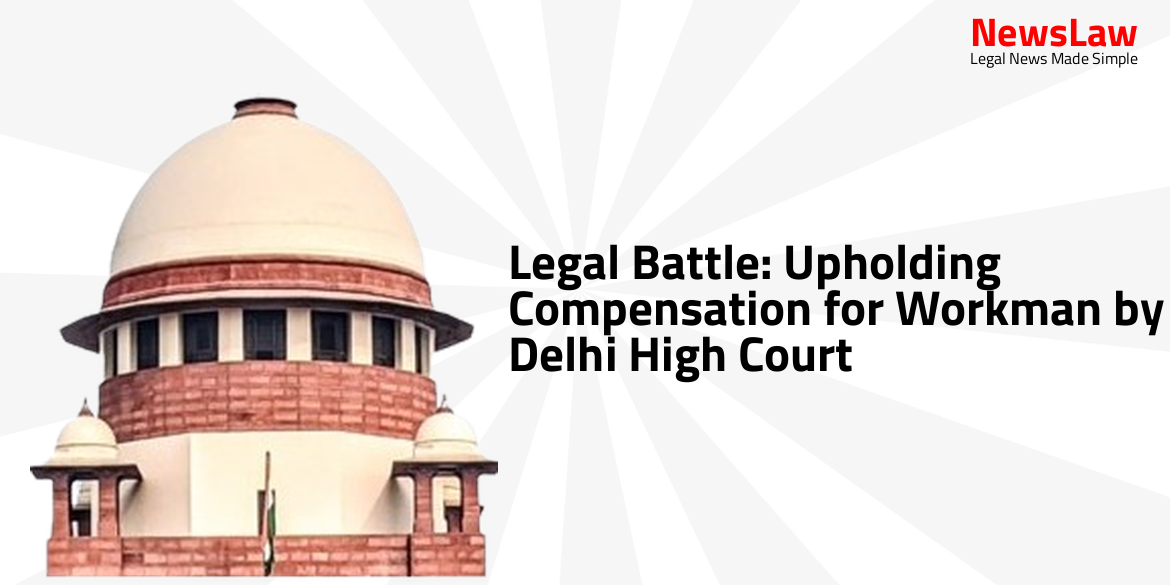Explore the nuanced legal analysis conducted by the court in a recent land acquisition case. The court carefully evaluated the provisions of the Acts, 1894 and 2013, ensuring a fair balance between the rights of landowners and authorities. This blog delves into the complexities of determining compensation and the impact of interim court orders on the award declaration process. Stay tuned to understand how the court navigated these legal intricacies to achieve justice for all parties involved.
Facts
- The High Court has allowed the writ petition filed by the original landowners, directing the appellant to pay compensation under Section 24(1) of the Act, 2013.
- The Moradabad Development Authority is aggrieved by the High Court’s order and has filed an appeal against the decision.
- The High Court directed the Moradabad Development Authority to declare the award and determine compensation under the Act, 2013 for the original landowners.
- High Court disposed of Writ Petition No. 3810 of 2005 by directing the State Government to consider the original landowners’ application under Section 48(1) of the Act, 1894.
- Original landowners argued that since no award was made under Section 11 of the Act, 1894, they should receive compensation under the provisions of Act, 2013.
- Moradabad Development Authority appealed the decision as the compensation determination under Act, 2013 was not specifically requested in the writ petition.
- Appellant contended that the award under Section 11 of the Act, 1894 could not be declared due to the pending writ petition and the interim stay granted by the High Court.
- Original writ petitioners challenged the acquisition proceedings based on the delay in making the award, leading to a writ petition and an interim stay on three specific plots.
- Possession of land, except the three plots under the writ petition, was taken over and awards were declared under Section 11 of the Act, 1894.
- The case was considered in light of the Parliament’s intention under Section 24(1)(a) of the Act, 2013 due to the unique circumstances of the pending writ petition.
- Subsequent writ petitions were filed by original landowners leading to the current Civil Appeals arising from judgments directing the declaration of awards under Act, 2013.
- Further details mentioned include the requisitioning of land in Village Ranopali, District Faizabad by the Faizabad Development Authority for a residential project.
Also Read: Ruling on Circumstantial Evidence in Murder Case
Arguments
- The petitioners, original landowners, contend that they should be entitled to compensation under the Act, 2013 despite the award not being declared due to pending writ petitions and interim stay by the High Court.
- The Land Acquisition Officer was not at fault for not declaring the award under Section 11 of the Act, 1894.
- There is no provision in Section 24(1) of the Act, 2013 to exclude the period of interim stay or pending writ petitions.
- Arguments are made that even though 80% of compensation was deposited, the award could not be declared due to the High Court’s stay orders.
- The High Court did not acknowledge the hindrance caused by the writ petitions and the interim stay in declaring the award.
- Reference is made to the case of Indore Development Authority vs. Manoharlal where similar issues were addressed by the Constitution Bench.
- The petitioners rely on the same case to argue for compensation under Section 24(1) of the Act, 2013 if no award was declared at the time of the Act’s commencement.
- It is emphasized that once the award is not declared under Section 11 of the Act, 1894, the landowners should be compensated according to the provisions of the Act, 2013.
- The High Court’s order directing the Development Authorities to declare the award under the Act, 2013 is criticized as an error.
- Arguments are made citing various legal principles regarding impossibility of performance and the principle of restitution in relation to litigation outcomes and compensation benefits.
- The interpretation of Section 24(2) of the Act, 2013 is discussed in light of excluding the period of interim orders passed by the Court, similar to situations where awards could not be declared due to such orders.
- The High Court has directed to declare the award and pay the compensation under Section 24(1) of the Act, 2013.
- The High Court’s direction is not to be interfered with by this Court.
- No error was committed by the High Court in instructing the Development Authorities to declare the award under Section 24(1) of the Act, 2013 and determine the compensation as per the provisions of the Act, 2013.
- In the counter affidavit, it was submitted that since the award has not been declared, it should be declared under Section 24(1) of the Act, 2013.
Also Read: Challenging Legal Presumptions in Negotiable Instrument Cases
Analysis
- It is necessary to delve deeper into the provision to assimilate the reasons as to why no award would have been made on the date of enforcement of the Act, 2013 in a scenario where acquisition had commenced under the repealed Act, 1894.
- Section 24(1)(a) of the Act, 2013 applies if no award under Section 11 of the Act, 1894 has been made on the enforcement of Act, 2013. The provisions of the Act, 2013 then apply for compensation determination.
- The principle of restitution is founded on doing complete justice by placing parties back in their original positions before litigation and interim orders.
- The interpretation and implementation of Section 24(2) involve exclusion of periods under interim orders preventing acquisition proceedings from being counted towards the 5-year term for lapse.
- Litigants who benefit from interim orders preventing award declarations cannot then claim higher compensation under the Act, 2013 at the expense of successful litigation, ensuring fairness and prevention of misuse of interim orders.
- The obligation on authorities to act within five years under Section 24 emphasizes prompt action, excluding periods of hindrance like interim court orders for a more efficient acquisition process.
- The act of courts or litigants in prolonging litigation unjustly through interim orders should not result in unwarranted benefits under the Act, 2013.
- The exclusion of periods under interim orders prevents unfair advantage and ensures that authorities are not penalized for circumstances beyond their control in award determinations.
- The intention behind Section 24 is to balance the rights of landowners and authorities, ensuring due process and fair compensation under both the repealed and new Acts.
- Provisions under Section 24 are aimed at preventing misuse of litigation tactics to gain higher compensation under the new Act, promoting efficiency and fairness in land acquisition processes.
- Section 24 of the Act, 2013 saves acquisitions initiated under the Land Acquisition Act, 1894, where no award had been made or where an award had been made under Section 11 of Act, 1894.
- The purpose of Section 24(1) of the Act, 2013 is to continue proceedings initiated under the Act, 1894.
- Section 6(b) of the General Clauses Act, 1897 ensures that the repeal does not affect previous operations or actions taken under the repealed enactment.
- The provisions of Section 114 and Section 6 of the General Clauses Act, 1897 are applicable in cases where possession has not been taken, and payment has not been made resulting in a lapse due to inaction of authorities.
- The continuation of proceedings is governed by Section 24(1)(b), where an award has been passed under the Act, 1894, even after the commencement of the Act, 2013.
- The principle of restitution is a remedy against unjust enrichment or unjust benefit.
- Delays in court proceedings can lead to undue advantage for unscrupulous parties involved.
- Mistakes of the court can be corrected by the court itself.
- Grant of stay does not automatically extend statutory protection.
- Interim orders merge into final decisions, and no benefit can be derived from mere pendency of a case in court.
- Undeserved or unfair advantages gained through court jurisdiction must be neutralized.
- Inherent jurisdiction of the court to mitigate damage suffered by defendants due to court actions.
- Restitution principle applies to situations where one party gains undeserved advantage due to court orders.
- Maxims like actus curiae neminem gravabit and lex non cogit ad impossibilia play a role in preventing unjust gains and addressing impossibilities.
- Provisions under Section 144 of the Code of Civil Procedure recognize and implement the principle of restitution.
- Landowners can seek recourse to law for enhancement of compensation under the provisions of the Land Acquisition Act, 1894.
- The determination of compensation declared under the Act, 1894, can be challenged for enhancement only through the Land Acquisition Act, 1894.
Also Read: Legal Analysis of Admission Irregularities in Educational Institutions
Decision
- The concerned appropriate Authority(s) are authorized to declare the award under Section 11 of the Act, 1894 and determine compensation under the Act, 1894.
- The compensation to be determined taking into account Section 114 of the Act, 2013 read with Section 6 of the General Clauses Act, 1897.
- Original landowners to be paid compensation accordingly.
- The present appeals are allowed with no order as to costs.
- The impugned judgments and orders of the High Court are quashed and set aside.
- All appeals are allowed based on the above discussion and conclusion.
Case Title: FAIZABAD AYODHYA DEVELOPMENT AUTHORITY Vs. DR. RAJESH KUMAR PANDEY (2022 INSC 613)
Case Number: C.A. No.-002915-002915 / 2022



